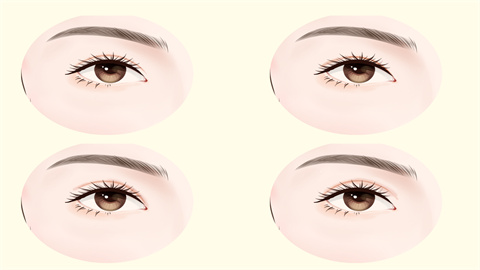How to address difficulty lifting the eyelid after full incision double eyelid surgery
Generally, after full-incision double eyelid surgery, the inability to lift the eyelids may be related to postoperative edema, residual anesthetic drugs, postoperative fatigue, conjunctivitis, or damage to the ocular nerves. It is recommended to seek timely medical attention and adopt general treatments, medication, or other therapies under a doctor's guidance. The specific analysis is as follows:

1. Postoperative Edema
After full-incision double eyelid surgery, the ocular tissues experience trauma, triggering a local inflammatory response that leads to edema. This edema may compress the levator palpebrae superioris muscle, causing the eyelids to be difficult to lift. It is recommended to follow medical advice for postoperative care, including cold compresses and pressure dressing to reduce swelling.
2. Residual Anesthetic Drugs
Anesthetics used during surgery may remain in the ocular tissues for some time after the procedure, affecting the normal function of the levator palpebrae superioris muscle and causing difficulty in lifting the eyelids. Residual effects of anesthetics typically subside gradually over time and require no special treatment.
3. Postoperative Fatigue
Postoperatively, patients may suffer from insufficient sleep and eye fatigue due to pain, discomfort, anxiety, or other factors, which may affect the contractility of the levator palpebrae superioris muscle. It is recommended to ensure adequate rest after surgery and avoid prolonged eye use to help alleviate eye fatigue.
4. Conjunctivitis
Conjunctivitis is usually caused by infection with pathogenic microorganisms. The infection triggers conjunctival inflammation, leading to restricted function of the levator palpebrae superioris muscle and difficulty in lifting the eyelids. Symptoms typically include ocular congestion, pain, and increased secretions. Treatment may include medications such as levofloxacin eye drops, tobramycin eye drops, or chloramphenicol eye drops, under a doctor's guidance.
5. Ocular Nerve Damage
Ocular nerve damage may be caused by postoperative infection or other factors. When the nerves are damaged, they can no longer effectively control the levator palpebrae superioris muscle, resulting in difficulty lifting the eyelids. This condition is usually accompanied by symptoms such as numbness or pain in the eye. Treatment options may include medications such as mecobalamin tablets, vitamin B1 tablets, or sodium citicoline capsules, as recommended by a physician.
Maintaining good daily habits and regularly cleaning the eyes to preserve ocular hygiene is also important.




